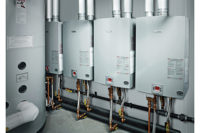The complex has cozy garden rentals complemented with a rich array of amenities, including tennis and basketball courts, a pool and, best of all, free heat and hot water.
There are 16 buildings with 30 units per building and each is served by four old boilers and one 50-gal. domestic hot water tank installed in 1972. During the long New England winters, the boilers ran all day, every day, and frequently broke down at the least convenient times. The installation generated up to seven or eight service calls a day or night. Maintenance crews replaced 12 to 15 circulators every season costing between $400 to $700 apiece.
To top off the problem, there was as inadequate supply of hot water. This frustrated tenants and led to high resident turnover as fuel expenses, carried by the community owners, compromised profits.
Solving the problem
Canterbury had two objectives: lower fuel consumption and reduce maintenance expenditures. Management considered seven different vendors, but after a boiler-room survey and a commercial product evaluation program that projected anticipated fuel savings and expertly sized incoming boilers, Canterbury went with Viessmann. The complex installed Viessmann’s Vitodens 200-W, B2HA 150 wall-mounted, gas-fired condensing boilers and the 79-gal. Vitocell 300-B dual-coil indirect hot water tanks. Each building had two boilers and two indirect hot water tanks installed.
The boilers are manufactured around an exchanger crafted from titanium/stainless steel and incorporate three-way mixing valves that control the temperature of return water. These are able to capture as much as 8,000 Btu of “free” heat from every gallon of condensate, contributing to a combustion efficiency rating of 93%.
The Lambda Pro combustion system continuously monitors flame quality and automatically adjusts both the fan speed and the gas valve to accommodate variations in fuel quality. With the use of digital controls, Canterbury can shape the heating curve – the ratio of increase in boiler temperature to the decrease in outside air temperature – for maximum efficiency. In the first year, Canterbury has been able to move the curve to 1.5 without any resident discomfort and management anticipates it will be able to drop it to 1.2 in the near future.
With dual coils, the Vitocell hot water tanks easily can accommodate future solar inputs. Thanks to reverse-return piping, each building’s two tanks evenly share the load, reducing the strain on any one tank.
Installation started in late September 2013 and was completed by Thanksgiving. Even though the system did not serve a complete season, Canterbury saw a 15% reduction in fuel costs in 2013 and expects savings, because of the sophistication of the system’s digital sensors and controls, of as much as 30% in years to come.
Maintenance calls and hot water complaints, once a mainstay of the winter season, have disappeared. With additional investments in insulation, replacement windows and other energy-savings initiatives, Canterbury expects a much greener – and less expensive – future for itself and its residents.
Jim Bolduc is Viessmann’s northeast territory manager and performed the boiler room survey and commercial product evaluation for the Canterbury Apartment project.



